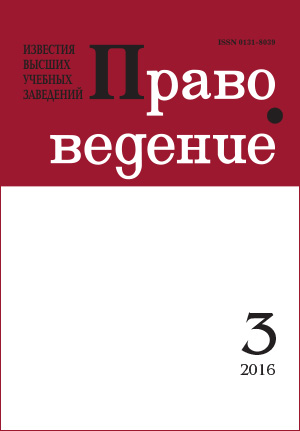Онтологические регионы права
Аннотация
Классические исследования концептуальных и теоретических проблем права концентрируются на изучении «общего» и «универсального» для правовых систем. Основные вопросы рассматриваются теорией через понятийный аппарат, который представляет право в «общих» логических и «универсальных» языковых формах. Между тем язык права никогда не бывает нейтральным к тому, что он представляет, и влияет на существование права в качестве предмета. Автор следует постклассическим взглядам на то, что язык не только метод называния (дефинирования) предметов, но и способ их понимания человеком. Право видится нам в различных формах, что делает необходимым анализ этих представлений, которые связаны с нашим восприятием и пониманием. Многообразие образов права раскрывается с помощью феноменологического метода и идеи Гуссерля о том, что формы представления предметов всегда зависят от их онтологической дифференциации. Гуссерль различает дифференциацию онтологии материальных объектов, событий, состояний и отношений, а также формальных и апофантических предметов теории, выраженных понятиями и категориями. Обсуждение сущности предмета права и его предикативных форм позволяет проводить различия между тем, «что» представляет собой право, и тем, «как» оно в реальности существует. Классический предмет права, обозначенный и включенный в дефиницию понятия, выступает как метафизический конструкт вне реального бытия. Дифференцированная онтология права помогает делать наглядным, что «жизненный мир» и «мир знаний» принадлежат к разным видам реальностей, которые не проецируемы друг к другу. Как считает автор, формально-логический анализ права всегда противопоставлен опыту понимания права, в пространстве которого живет и действует человек. Понимание права выступает как метод интерпретации, который направлен на реконструкцию сформированных значений с позиции разных субъектов. Цель понимания права направлена на экспликацию значений того, что из внутренней перспективы выражает действие или переживание человека. Как подчеркивал Хайдеггер, понимание не достигается специальными научными методами, которые ориентированы на познание и теоретическое понимание; понимание есть практическая сторона жизни человека, связь с жизненными ситуациями, которые проектируют различные возможности для права. Способность понимания права развивается через коммуникацию и диалог, которые помогают находить компромисс для разных субъектов. Как показывает феноменологический взгляд на право, правовое знание является не только социальным продуктом, но и продуктом индивидуальных ценностей, переживаний и действий человека. По мнению автора, ключевым моментом постклассического правопонимания выступает вопрос о том, что лежит в основе бытия права как «предмета» — язык, мысли, индивидуальный опыт, действия или социальная практика. Этот подход требует рассмотрения права через перспективу дифференцированной онтологии, где право принадлежит различным видам реальности.
Ключевые слова:
онтология и эпистемология права, дифференцированная онтология права, феноменологический метод в праве, знаковые формы права, понятие права, семантика и прагматика права, язык права, правовая коммуникация, диалог права, сущность права, ценности права, правовые действия, предмет права и его значение, постклассический подход к изучению права, понимание права
Скачивания
Библиографические ссылки
Загрузки
Опубликован
Как цитировать
Выпуск
Раздел
Лицензия
Статьи журнала «Правоведение» находятся в открытом доступе и распространяются в соответствии с условиями Лицензионного Договора с Санкт-Петербургским государственным университетом, который бесплатно предоставляет авторам неограниченное распространение и самостоятельное архивирование.




